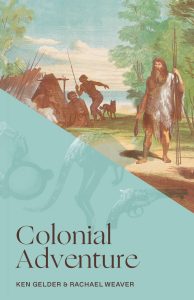Title: Colonial Adventure
Authors: Ken Gelder and Rachael Weaver
Publisher: Melbourne University Press, October 2024; RRP: $29.99
The term picaresque pops up a bit in Colonial Adventure, and similarly to the travelling adventurer of that particular style of yarn, our narrators here are passing through a series of locations as they lead a guided tour through the body of works exploring the colonial experience in pre-Federation Australia. Our guides here are Emeritus Professor of English at the University of Melbourne Ken Gelder and ARC Future Fellow at the University of Tasmania Rachael Weaver.
This is not Gelder and Weaver’s first expedition into this terrain, the pair having collaborated on three other titles in a similar vein, and their experience as academic researchers and collaborators provides a smooth, logically composed journey here. They keep the text accessible and kindly throw forwards and backwards to repeated references to help keep the reader up to speed without the flicking of pages.
There is a large body of work to cover – the end notes, bibliography and index run to about 60 of the 240 pages – and the authors do well to keep the tour moving across the most interesting or illustrative of examples, pausing in places to elaborate on the significant postcard moments such as the well-known William Buckley and Eliza Fraser. This pair feature in a chapter titled ‘Castaways and Cohabitants’, which delves into the presentation of their experience as dwellers with Aboriginal peoples as well as the aftermath of their experiences.
Not surprisingly given the book’s title, the ‘adventures’ here – whether journals, reportage/memoir, or fiction – are backgrounded in the way they reflect colonial thought and often the relationship between invader/occupier and First Nations people. The authors have gone to lengths to attempt to identify the names of Country on which events take place, thus acknowledging the diversity of First Nations cultures and the impact upon them. But the authors also note that ‘(c)olonial adventure was not always overtly in the service of empire’ and ‘could also transmit information about people and places never before seen; some of that information might even disturb the ideologies that colonisation relied on’.
The nationwide tour begins with explorers, with James Cook and William Dampier to the fore, and what is a foundational but fairly dry opening discussion on where such sanctioned escapades fall within the genre, before opening up to more exotic narratives of early encounters with New Holland. This is followed by four more chapters that trace the changing attitude to the land and its exploitation/occupation: ‘Transportation and Convict Adventures’, the previously mentioned ‘Castaway’, Bushrangers etc’, and ‘The Speculation of Colonisation’, which focuses on the planned settlement and opening up of the land as an economic endeavour. The latter takes in Lemurian fictions (based on lost or undiscovered civilisations), where First Nations peoples are again undermined by the ideal of a European or otherwise technologically advanced society occupying the inland of the country, with or without the fabled inland sea.
The idea of adventure is an element of discussion, wherein the picaresque style of story comes into play as a step in the evolution of the colonial experience: from explorers mapping the coastline to fictional and non-fictional roguish visitors enjoying outlandish adventures to brag about on their return home, to those here for the long haul, exploiting the natural resources in the hunt for wealth. The adventures extend to women and Aboriginal resistance fighters, too, and one of the interesting elements of these stories is how some bushrangers (both Black and white) occupied ‘liminal’ spaces in which they both opposed and supported the ruling power.
As mentioned, it’s a guide book, a starting place for researchers and the casually interested, a window seat offering an overview of the relationships between the new arrivals and the land and its people, revealing the mindset that justified terra nullius, murder and dispossession, and leaving the lingering sensation that these attitudes are not yet merely moments of history but still active currents at economic and socio-political levels.
Reviewed by: Jason Nahrung
Ballarat Writers Inc. Book Review Group
Review copy provided by the publisher

Leave a Reply